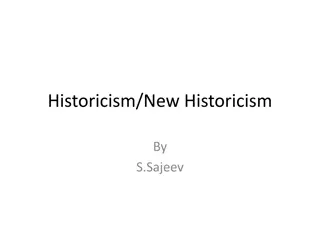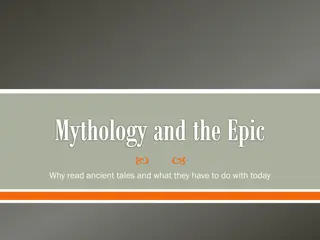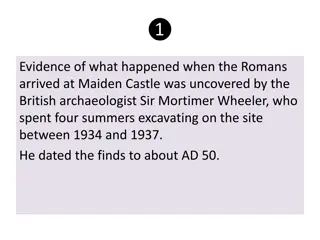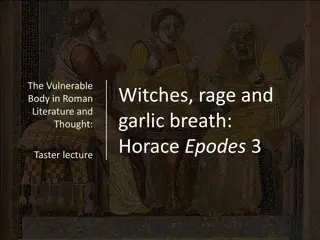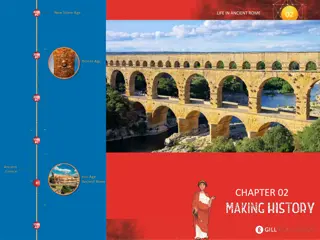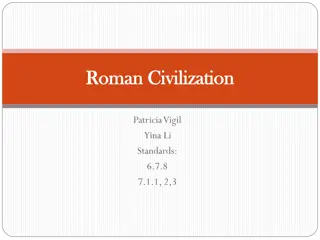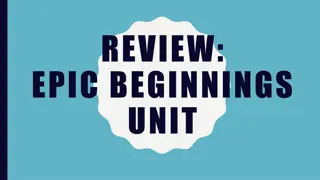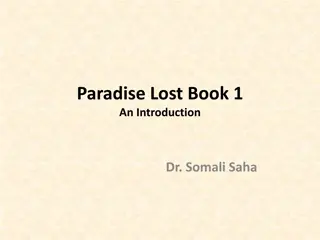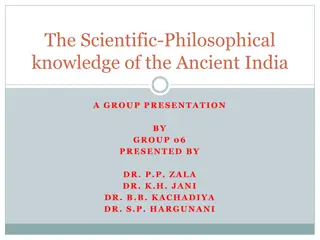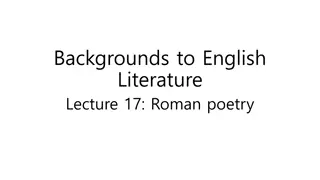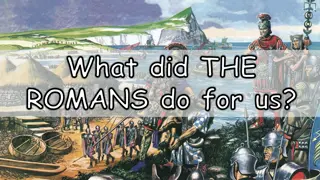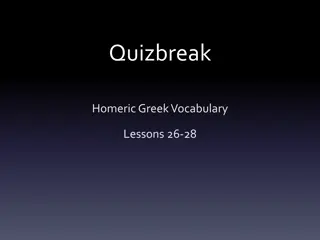Perspectives on Homeric Epic: From Ancient Texts to Roman Views
Explore various perspectives on Homeric epics from ancient texts, including key passages from Homer's Iliad and Odyssey, insights from Thucydides, Lucian's witty encounter with Homer, and Herodotus' views on Greek religion and mythological origins. Delve into the rich tapestry of literary and historical interpretations that shed light on the enduring legacy of Homeric poetry.
Download Presentation

Please find below an Image/Link to download the presentation.
The content on the website is provided AS IS for your information and personal use only. It may not be sold, licensed, or shared on other websites without obtaining consent from the author.If you encounter any issues during the download, it is possible that the publisher has removed the file from their server.
You are allowed to download the files provided on this website for personal or commercial use, subject to the condition that they are used lawfully. All files are the property of their respective owners.
The content on the website is provided AS IS for your information and personal use only. It may not be sold, licensed, or shared on other websites without obtaining consent from the author.
E N D
Presentation Transcript
#AskAnAcademic: Homeric Epic Dr David Fearn University of Warwick d.w.fearn@warwick.ac.uk
Homer: some key passages Iliad 2.594-600: The Muses encountering Thamyris the Thracian stopped him from singing as he came from Oichalia and Oichalian Eurytos; for he boasted that he would surpass even the Muses themselves, daughters of aegis-bearing Zeus, if they were to sing against him. These in anger against him maimed him, and took his wondrous voice away from him, and made him a singer without memory.
Odyssey 8.625 on the Phaeacian bard Demodocus: The herald came near, bringing with him the excellent singer Whom the Muse had loved greatly, and gave him both good and evil. She reft him of his eyes, but she gave him the sweet singing art.
Thucydides 3.104, with end of the Delian section of the Homeric Hymn to Apollo (Trans. S. Lattimore)
The wry perspective from Lucian in the Roman Imperial Period (C2 AD) Hardly two or three days had passed before I went up to Homer the poet when we were both at leisure, and questioned him about everything. Above all, said I, where do you come from? This point in particular is being investigated even yet at home. I am not unaware, said he, that some think me a Chian, some a Smyrniote and many a Colophonian. As a matter of fact, I am a Babylonian, and among my fellow-countrymen my name was not Homer but Tigranes. Later on, when I was a hostage (homeros) among the Greeks, I changed my name. I went on to enquire whether the bracketed lines had been written by him, and he asserted that they were all his own: consequently I held the grammarians Zenodotus and Aristarchus guilty of pedantry in the highest degree. Since he had answered satisfactorily on these points, I next asked him why he began with the wrath of Achilles; and he said that it just came into his head that way, without any study. Moreover, I wanted to know whether he wrote the Odyssey before the Iliad, as most people say: he said no. That he was not blind, as they say, I understood at once I saw it, and so had no need to ask. Lucian, A True Story 2.20
Herodotus 2.53 on Greek religion (trans. De Selincourt, Penguin): But it was only if I may so put it the day before yesterday that the Greeks came to know the origin and form of the various gods, and whether or not all of them had always existed; for Homer and Hesiod are the poets who composed theogonies and described the gods for the Greeks, giving them all their appropriate titles, offices, and powers, and they lived, as I believe, not more than four hundred years ago. The poets who are said to have preceded them were, I think, in point of fact later. This is my personal opinion, but for the former part of my statement on these matters I have the authority of the priestesses of Dodona.
Man A man, Muse, tell me his story: a man of many ways, who was driven to wander far, after he had sacked the sacred citadel of Troy. Many men were they whose cities he saw, whose minds he learned; many the pains he suffered at heart on the wide sea, struggling for his own life and the homecoming of his companions. Odyssey 1.1-5
Come, tell us of your adventures: Alcinous recapitulates the proem So come now tell me this and give me an accurate answer: Where you were driven off your course, what countries peopled by men you came to, the men themselves and their strong-founded cities, and which were savage and violent and without justice, and which were hospitable and with a godly mind for strangers. Odyssey 8.573-6
Odysseus describing the Cyclopes Cyclopes who, putting all their trust in the immortal gods, neither plow with their hands nor plant anything, but all grows for them without seed planting, without cultivation These people have no institutions, no meetings for counsels; rather they make their habitations in caverns hollowed among the peaks of the high mountains, and each one is the law for his own wives and children, and cares nothing about the others. the country of the lawless outrageous Odyssey 9.106-15 Inside the cave there lodged a monster of a man (an r pel rios) ; his mind was lawless, and in truth he was a monstrous wonder made to behold, not like a man, an eater of bread, but more like a wooded peak of the high mountains seen standing away from the others. Odyssey 9.186-92
Characterizing Killing And like a lion reared in the hills, without leaving anything, he ate them all, entrails, flesh and the marrowy bones alike. Odyssey 9.292-3 There Eurykleia found Odysseus among the slaughtered dead men, spattered over with gore and battle filth, like a lion who has been feeding on an ox of the fields, and goes off covered with blood, all his chest and his flanks on either side bloody, a terrible thing to look in the face; so now Odysseus feet and the hands above them were spattered. Odyssey 22.401-6
Suggestions for Further Reading Recommended translations of the Iliad and Odyssey: Richmond Lattimore (used here); Robert Fagles; Emily Wilson Introductions / Collections of Essays L. Dougherty, Oxford Readings in the Odyssey (OUP 2009) B. Graziosi, Homer: A Very Short Introduction (OUP 2019) extremely useful, with lots of further references and bibliography. R. Osborne, Greece in the Making: 1200-479 BC (Routledge 1996) S. Schein (ed.) Reading the Odyssey: Selected Interpretive Essays (Princeton 1996)






